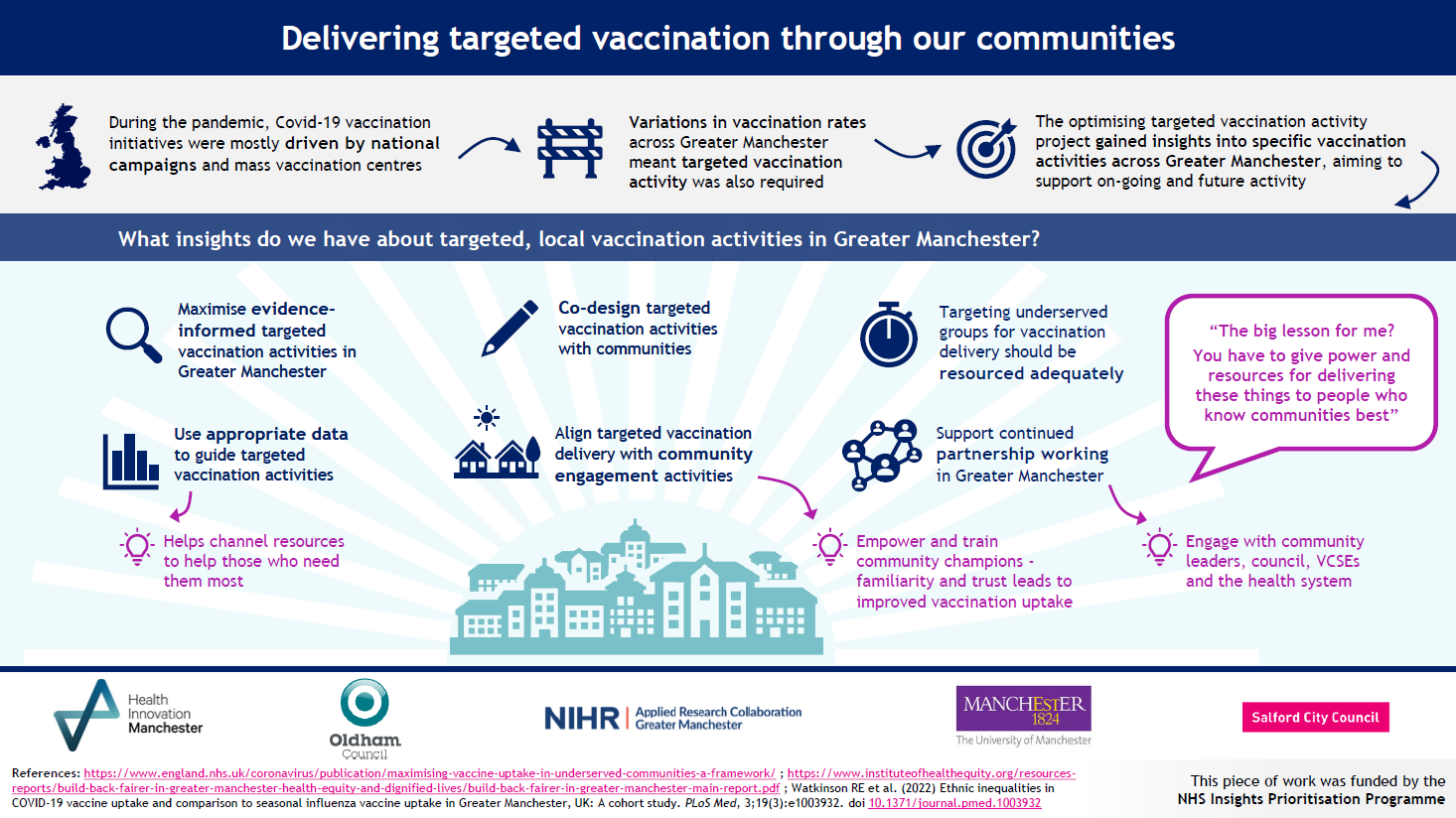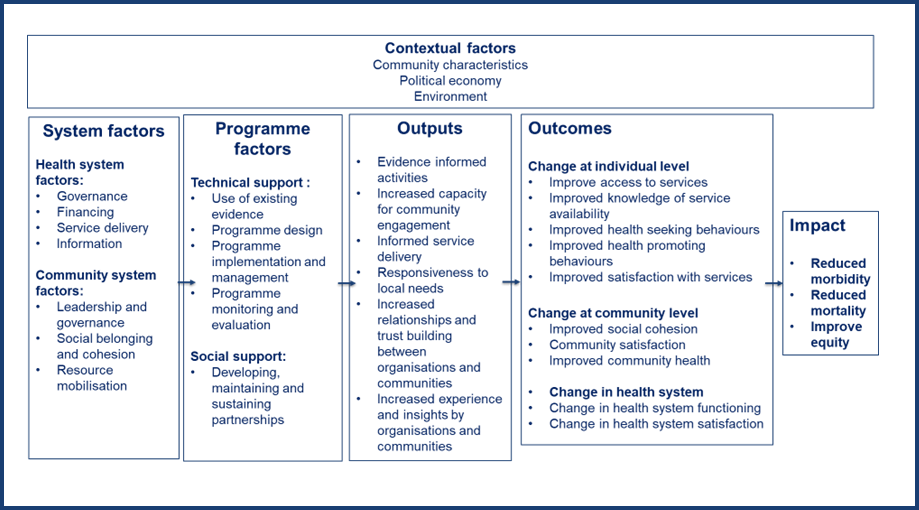The National Insights Prioritisation Programme (NIPP) - Optimising vaccination in Greater Manchester
This builds on our earlier work to understand the community experiences in Greater Manchester during the COVID-19 pandemic and explore inequalities in the COVID-19 vaccination programme, where we conducted a series of research projects to expore:
- Inequalities in the COVID-19 vaccination programme in Greater Manchester.
- The drivers behind these inequalities and the responses to the COVID-19 vaccination in Greater Manchester
- The role of the voluntary sector in supporting the response to the pandemic and vaccination programme
- Inequalities in the routine inflluenze vaccination programme post-COVID.
For more information about this early work please see the Understanding Community Experiences in GM during the COVID-19 panedmic and exploring inequalities in the COVID-19 vaccination programme website - here.
What did we do?
The NHS Insights Prioritisation Programme (NIPP), commissioned by the NHS Accelerated Access Collaborative (AAC) and the National Institute for Health and Care Research (NIHR), was designed to accelerate the evaluation and implementation of innovation that supports post COVID-19 pandemic ways of working, focussing on building service resilience and delivering benefits to patients. Its main objectives are:
- To facilitate Applied Research Collaborations (ARCs) and the Health Innovation Network's (HIN's) contribution to NHS Reset and Recovery by generating rapid insights in relation to promising innovations;
- To identify interventions that will contribute to Integrated Care Systems (ICSs) and regional needs, aligned to the four Beneficial Changes Network themes; namely: a) remote consultation; b) remote monitoring; c) new approaches to service delivery; and d) Health and Social Care workforce;
- To build local capacity and expertise for evaluation and implementation.
As part of this programme we received funding to provide rapid insights into the way vaccinations for COVID-19 were provided to people living within Greater Manchester, with the aim of improving local vaccine uptake and delivery in future.
We took a rapid evaluation approach to explore:
- Vaccination activity that was implemented to date in Greater Manchester;
- The evidence for community-targeted vaccine delivery;
- The variation in vaccine coverage rates at a local area level across Greater Manchester;
- High priority areas and vaccine delivery approaches that then became the focus of further implementation.
Why was it important?
The COVID-19 pandemic had an unequal impact on different groups of people in the UK. Greater Manchester saw disproportionally high virus-related morbidity and mortality. Whilst vaccination had a huge impact, varying rates of vaccine coverage may have led to different outcomes. By increasing vaccination rates, this work could have reduced inequalities and provided a learnt, lasting legacy of best practice for vaccination delivery in Greater Manchester.
How did we do it?
We used a mixed methods approach:
- We undertook interviews and surveys with relevant staff to describe models of vaccination delivery.
- We undertook a rapid review of vaccination delivery approaches that have been used elsewhere which aim to increase vaccination uptake.
- We used routine data sets to assess vaccination uptake rates in Greater Manchester and at a more local level.
- We drew insights together from these phases and worked with local stakeholders to develop an implementation framework to support future activities.
What we found:
We generated six key insights from our work that may be useful to community-informed targeted vaccination activities.
Relating to engagement and communication:
- Key insight 1: Use of evidence-informed targeted vaccination activities should be maximised in Greater Manchester.
- Key insight 2: Community engagement should be used to co-design targeted vaccination activities.
- Key insight 3: Targeted vaccination delivery must dovetail with coordinated community engagement activities.
- Key insight 4: Targeting underserved groups for vaccination delivery should be supported by adequate resourcing.
Relating to the use of data
- Key insight 5: Targeted vaccination activities should be guided by appropriate quantitative and qualitative data.
Relating to Wider contextual issues that impact on vaccination activities
- Key insight 6: Continued partnership working should be supported in Greater Manchester.
(click image to enlarge)
After identifying our 6 key insights, we explored these with local stakeholders. We mapped our data to an existing, relevant framework and developed a bespoke implementation framework for community informed targeted vaccination.
We aimed to make explicit the different factors, outcomes and impacts our data flagged for consideration when developing a programme of community-informed targeted vaccination activities. The framework can subsequently aid programme designers and implementers.
Implementation Framework to support a programme of community-informed targeted vaccination activities
The full evaluation report and summary report are available below
Downloadable resources
- Publications
- Bradley F, Nelson PA, Dumville J. (2025). Implementing targeted vaccination activities to address inequalities in vaccination: a qualitative study. Journal of Public Health
- Norman, G., Kletter, M. & Dumville, J. (2024) Interventions to increase vaccination in vulnerable groups: rapid overview of reviews. BMC Public Health
- Reports
- Optimising Vaccination Activity in Greater Manchester - summary report (published March 2024)
- Optimising Vaccination Care in Greater Manchester - full report (published October 2023)
- NHS Insights Prioritisation Programme Report: rapid insights into new ways of working post-pandemic (published March 2024)
- News stories
- Unique research collaboration highlights innovative approaches for post-pandemic healthcare (published March 2024)
Who did we work with?
- Health Innovation Manchester
- The Greater Manchester Integrated Care Partnership
- NHS England
- The Health Innovation Networks
More information

Programme Manager
Dr Ross Atkinson
ross.atkinson@manchester.ac.uk


